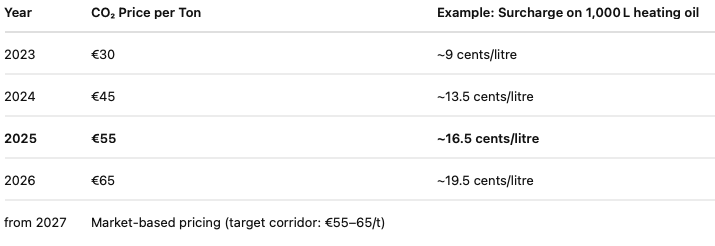Since 2021, Germany has implemented a national carbon price on fossil fuels such as natural gas, heating oil, diesel, and gasoline. This has direct cost implications for companies and commercial properties using fossil-based energy for heating or mobility. The price will rise steadily and is becoming a key factor in energy-related operating costs.
What Is Being Priced – and Who Is Affected?
The CO₂ price applies to all companies that use fossil fuels either directly or indirectly, including:
Office buildings, medical practices, hotels using oil or gas heating
Logistics, crafts, and delivery companies with diesel vehicle fleets
Supermarkets, schools, care facilities, and housing providers with gas boilers or CHP systems
Companies do not pay the carbon price directly. It is added indirectly via fuel and energy suppliers and included in the final energy bill.
What Is the Current CO₂ Price – and How Will It Develop?

Example (2025):
A company consuming 1,000,000 kWh of natural gas (approx. 100,000 m³) pays around €10,000–12,000 per year in carbon costs alone – and this will increase further.
What Does This Mean for Your Business?
Your operating costs will rise year by year unless action is taken.
Energy-intensive operations such as heating, hot water, transport, or industrial processes will become less competitive.
Even in rental situations (e.g. offices or commercial properties), carbon costs are increasingly passed on to tenants – with growing regulation.
How to Respond Strategically
At Haas Sustainable Consulting, we help businesses reduce carbon costs and emissions through:
Energy audits to identify technical and financial savings
Technology evaluation & conversion to heat pumps, solar thermal, waste heat recovery, or H₂-ready systems
Subsidy advisory for low-carbon building upgrades
Development of a CO₂ roadmap to secure long-term competitiveness and reduce risks
Conclusion
The carbon price on fossil fuels is no longer a minor issue – it’s a relevant cost and competitiveness factor. Those who act now can cut emissions, reduce energy bills, and access valuable government incentives.
Leverage our expertise to make your energy supply future-ready, efficient, and climate-compliant.
Get in touch today – Let’s build your tailored decarbonization strategy.
